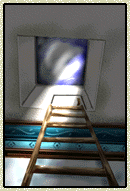


lats.
"They call them flats here. I wonder why?" she thought, padding around in her socks. There was nothing flat about them. She scanned the curios on the mantle. They seemed delicate and strange. A china swan, with a black band around its neck. A graceful, painted glass decanter, marked with translucent red lilies. A tiny, carved ivory fisherman. She examined each in turn, dusting the ivory man with the hem of her shirt.
The flat (she liked the way that sounded) belonged to her mother's aunt, Shirley, a wiry, dark little woman whose energy matched Leslie's own. When Mom wasn't around (which was most of the time) Shirley flirted with dad the way the check-out girls did. She liked Shirley, though. Shirley was funny. She could talk to Shirley.
Continuing her survey from the front hall, Leslie looked up at the ceiling to discover that a small door, half the normal height, was set into the ceiling below the cracked and smoky skylight. The tone of the morning fell away, leaving only the musty intrigue of this little door.
Shirley's apartment, which had once been used as the servant's quarters, was at the top of six grueling flights of stairs. She had never really climbed stairs before: all the buildings she frequented were either one story Western American affairs or multi-story public places with elevators, escalators or both. Odd as it sounded, she had never in her life climbed more than one flight of stairs at a time. As a result, the trek up to Shirley's flat seemed a journey unto itself.
"Is your elevator broken?" She had asked Shirley as they rounded the fifth newel post. Shirley laughed and explained, "There are no elevators in this building. This used to be one family's house. Can you imagine?"
"How old is it?" her father asked. Leslie thought, for some reason, he was asking about the age of the family that had owned the house (which she didn't understand).
"The house was built in 1892 and in 1919 it was apportioned out into apartments. The family would have lived in the bottom floors. The top two were the servants quarters."
A simple ladder, folded up like a waiting spider, was attached to the wall and terminated beneath the little door. A rope strung its way through a complex set of pulleys and ended in a rounded wooden handle. The handle, well above the heads of adults, was beyond her reach.
She remembered a film they had been shown in science class about monkeys and bananas hanging from the ceiling and laughed.
 It took a chair and a short stool, but she made it to the rope. The ladder hadn't been used in years
and her attempt to free it, freed herself instead. She tumbled from her improvised access and caught
herself on the rope. Wood and old hinges groaned together as the ladder unfurled, gently (well
almost) dropping her to the ground. If not for the ladder itself she would have landed without
injury, as it was, the wooden foot had smacked her square on top of the head, breaking the skin and
raising a knot.
It took a chair and a short stool, but she made it to the rope. The ladder hadn't been used in years
and her attempt to free it, freed herself instead. She tumbled from her improvised access and caught
herself on the rope. Wood and old hinges groaned together as the ladder unfurled, gently (well
almost) dropping her to the ground. If not for the ladder itself she would have landed without
injury, as it was, the wooden foot had smacked her square on top of the head, breaking the skin and
raising a knot.
She scampered up the ladder and in to the hushed gloom of the apartment's tiny attic.
©1995 Hyperbole Studios Inc.